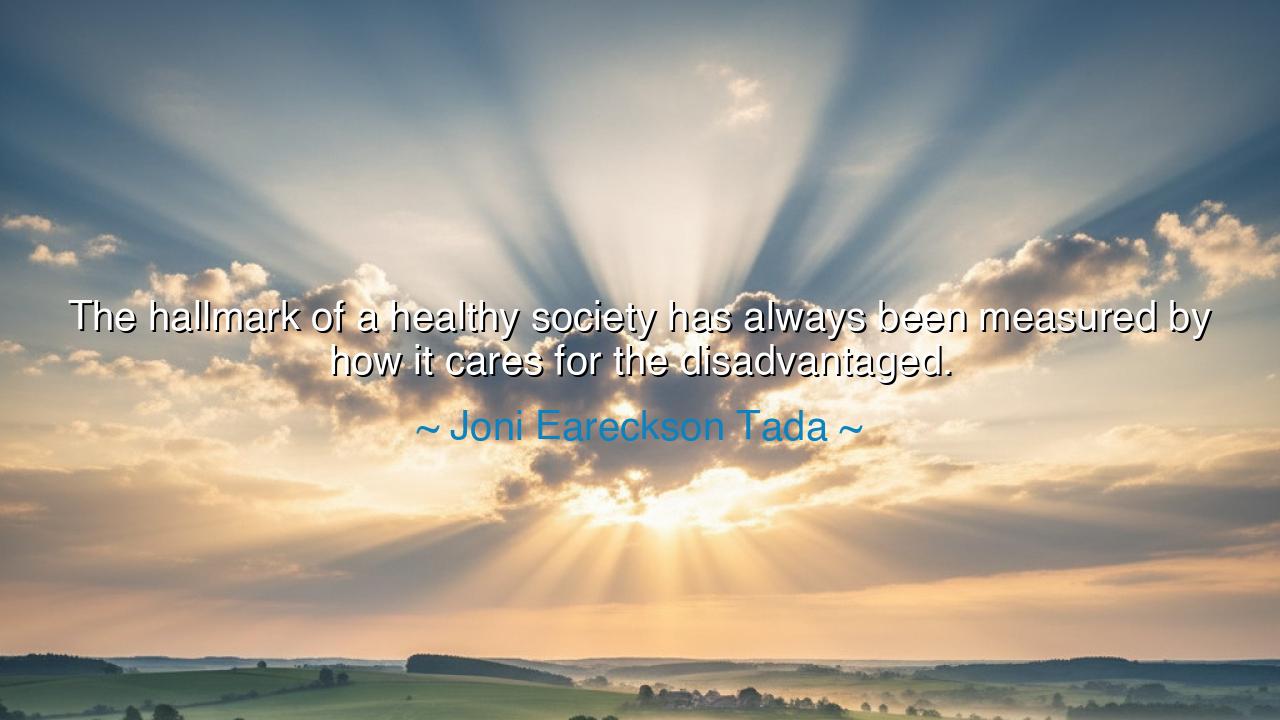
The hallmark of a healthy society has always been measured by how
The hallmark of a healthy society has always been measured by how it cares for the disadvantaged.






The servant of compassion and courage, Joni Eareckson Tada, spoke with wisdom born of suffering when she declared: “The hallmark of a healthy society has always been measured by how it cares for the disadvantaged.” These words pierce through all illusions of power, wealth, and grandeur, reminding us that the true greatness of any people is not in their armies, their palaces, or their treasures, but in their kindness to the weak, their mercy to the broken, their love for those who cannot repay.
For the disadvantaged—the poor, the disabled, the orphan, the widow, the stranger—stand as the test of a nation’s heart. It is easy for a people to honor the strong, to elevate the successful, to worship the rich. But the soul of a society is revealed in how it treats those who have nothing to offer in return. When the weak are abandoned, the society is sick, no matter its riches. When the weak are uplifted, the society is strong, no matter its poverty.
History resounds with this truth. Consider the laws of ancient Israel, where the prophets cried out that the measure of righteousness was in defending the widow, the orphan, and the stranger. Kings were judged not only by their victories in battle, but by whether they upheld justice for the poor. Likewise, in the Roman Empire, while power and conquest were prized, it was the rise of Christianity—teaching care for the outcast, the sick, the prisoner—that began to transform the empire from within. The true hallmark of health was not found in Caesar’s armies, but in the compassion of those who clothed the naked and fed the hungry.
In modern times, we see the same principle. When Franklin D. Roosevelt led America through the Great Depression, it was not only his economic reforms but his creation of systems to protect the vulnerable—the unemployed, the elderly, the disadvantaged—that marked the nation’s recovery. It was not merely prosperity that defined progress, but the recognition that a healthy society must shield its weakest members from despair. In his vision, Tada’s words find their echo: health is measured in mercy.
The meaning of her quote is both practical and eternal: the disadvantaged are not a burden to be discarded, but a sacred trust. They reveal the moral condition of the people around them. If ignored, they become a mirror of decay; if embraced, they become a beacon of compassion. To walk past the wounded is to betray one’s own humanity. To lift the wounded is to ennoble not only the sufferer but the one who lifts.
The lesson for us is fierce and undeniable: do not measure your society by its wealth, its technology, or its monuments. Measure it by its compassion. Ask: how does it treat the poor? How does it welcome the disabled? How does it shelter the outcast? For if the answer is cruelty or neglect, then the society is ill, no matter how rich it appears. And if the answer is mercy, then the society is strong, no matter how humble it may seem.
Practical wisdom flows: in your own life, turn your eyes toward the disadvantaged. Offer time, resources, or simply dignity to those who are forgotten. Support leaders and systems that protect the vulnerable, not exploit them. Teach your children that strength is not in domination, but in service. In this way, you carry within yourself the very hallmark of a healthy society, and by your actions, you help shape a community that is just and compassionate.
So let Joni Eareckson Tada’s words dwell in your heart: “The hallmark of a healthy society has always been measured by how it cares for the disadvantaged.” Let them guide you to judge your world not by glitter or power, but by kindness and mercy. For the truest legacy of any people is not carved in stone or written in gold, but found in the lives of the weak whom they lifted, the poor whom they defended, and the broken whom they healed.






AAdministratorAdministrator
Welcome, honored guests. Please leave a comment, we will respond soon